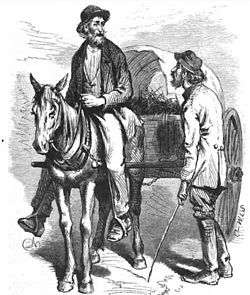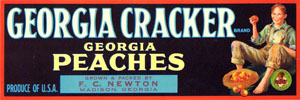
"A pair of Georgia crackers" as depicted by James Wells Champney from The Great South by Edward King, 1873
Etymology
There are multiple explanations of the etymology of "cracker", most dating its origin to the 18th century or earlier.One theory holds that the term derives from the "cracking" of whips, either by slave foremen in the antebellum South against African slaves, or by rustics to guide their cattle.[3][4][5][6] Those white foremen or rural poor who cracked their whips theoretically became known as "crackers."
Another whip-derived theory is based on Florida's "cracker cowboys" of the 19th and early 20th centuries; distinct from the Spanish vaquero and the Western cowboy. Cracker cowboys did not use lassos to herd or capture cattle. Their primary tools were cow whips and dogs.
The term "cracker" was in use during Elizabethan times to describe braggarts. The original root of this is the Middle English word crack meaning "entertaining conversation" (One may be said to "crack" a joke; a witty remark is a "wisecrack"). This term and the Gaelic spelling "craic" are still in use in Ireland and Scotland. It is documented in Shakespeare's King John (1595): "What cracker is this... that deafes our eares / With this abundance of superfluous breath?"
An alternative theory holds that the term comes from the common diet of poor whites. The 1911 edition of Encyclopedia Britannica supposes that the term derives from the cracked (kernels of) corn which formed the staple food of this class of people.
Examples of usage
As early as the 1760's, this term was in use by the upper class planters in the British North American colonies to refer to Scots-Irish and English settlers in the south, most of whom were descendants of English bond servants. A letter to the Earl of Dartmouth reads:Frederick Law Olmsted, a prominent landscape architect from Connecticut, visited the South as a journalist in the 1850's and wrote that "some crackers owned a good many Negroes, and were by no means so poor as their appearance indicated."
"Cracker" has also been used as a proud or jocular self-description. With the huge influx of new residents from the North, "cracker" is used informally by some white residents of Florida and Georgia ("Florida cracker" or "Georgia cracker") to indicate that their family has lived there for many generations. However, the term "white cracker" is seldom used self-referentially and remains an offensive racial slur used to demean Caucasians.
In 1947, the student body of Florida State University voted on the name of their athletic symbol. From a list of more than 100 choices, Seminoles was selected. The other finalists, in order of finish, were Statesmen, Rebels, Tarpons, Fighting Warriors, and Crackers.
Crackin' Good Snacks (a division of Winn-Dixie, a Southern grocery chain) has sold crackers similar to Ritz crackers under the name "Georgia Crackers". They sometimes were packaged in a red tin with a picture of The Crescent, an antebellum plantation house in Valdosta, Georgia.
Before the Milwaukee Braves baseball team moved to Atlanta, Georgia, the Atlanta minor league baseball team was known as the "Atlanta Crackers". The team existed under this name from 1901 until 1965. They were members of the Southern Association from their inception until 1961, and members of the International League from 1961 until they were moved to Richmond, Virginia in 1965. However, it is suggested the name was derived from players "cracking" the baseball bat and this origin makes sense when considering the Atlanta Negro League Baseball team was known as the "Atlanta Black Crackers".
The Florida Cracker Trail is a route which cuts across southern Florida, following the historic trail of the old cattle drives. In this context, the term refers to the cracking of the whips used by the Florida drovers.
Singer-songwriter Randy Newman, on his socio-politically themed album Good Old Boys (1974) uses the term "cracker" on the song "Kingfish" ("I'm a cracker, You one too, Gonna take good care of you"). The song's subject is Huey Long, populist Governor and then Senator for Louisiana (1928–1935). The term is also used in "Louisiana 1927" from the same album, where the line "Ain't it a shame what the river has done to this poor cracker's land" is attributed to President Coolidge.
In his speech "The Ballot or the Bullet", Malcolm X used the term "cracker" in reference to white people in a pejorative context. In one passage, he remarked, "It's time for you and me to stop sitting in this country, letting some cracker senators, Northern crackers and Southern crackers, sit there in Washington, D.C., and come to a conclusion in their mind that you and I are supposed to have civil rights. There's no white man going to tell me anything about my rights."
In 2008, former President Bill Clinton used the term "cracker" on Larry King Live to describe white voters he was attempting to win over for Barack Obama: "You know, they think that because of who I am and where my politic[al] base has traditionally been, they may want me to go sort of hustle up what Lawton Chiles used to call the 'cracker vote' there."
On June 27, 2013, in the trial of George Zimmerman, concerning the shooting of Trayvon Martin, the term "cracker" was mentioned in courtroom testimony. A witness under examination testified that Martin said (on the phone) to her that a "creepy ass cracker is following me" minutes before the altercation between Martin and Zimmerman occurred. Zimmerman's attorney then asked the black witness if that was an offensive term, to which the witness responded "no". That testimony and response brought about both media and public debate about the use of the word "cracker". A CNN report referenced the regional nature of the term, noting that cracker is regarded as a "sharp racial insult that resonates with white southerners even if white northerners don't get it."MSNBC hosts went on to say that Rachel Jentel was just speaking "Black English"
See also
- Georgia cracker
- Hillbilly
- Honky
- Jimmy Crack Corn
- List of ethnic slurs
- Redneck
- Social class in the United States




